When it comes to building muscle and recovering effectively, nutrition plays a crucial role.
I’ve found that the right dietary strategies can make a significant difference in how quickly I bounce back after a workout. Incorporating essential nutrients not only supports muscle growth but also helps in recovery, ensuring that I’m ready for my next challenge.
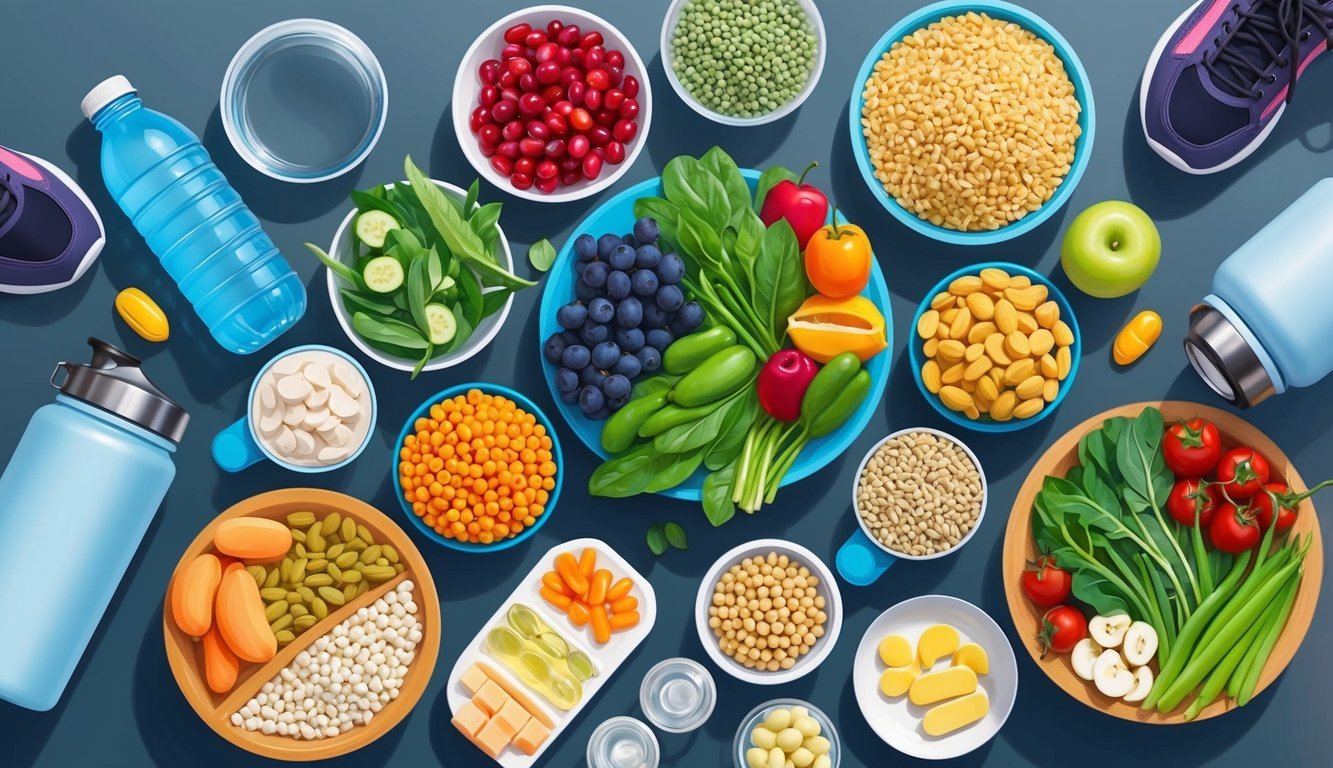
I often tweak my meal plans to include specific foods and nutrients that fuel both performance and recovery.
From what I’ve learned, there are 10 essential strategies that can really enhance how I eat for muscle growth and recovery.
Focusing on these can help anyone maximize their training efforts and see better results.
Whey Protein Isolate
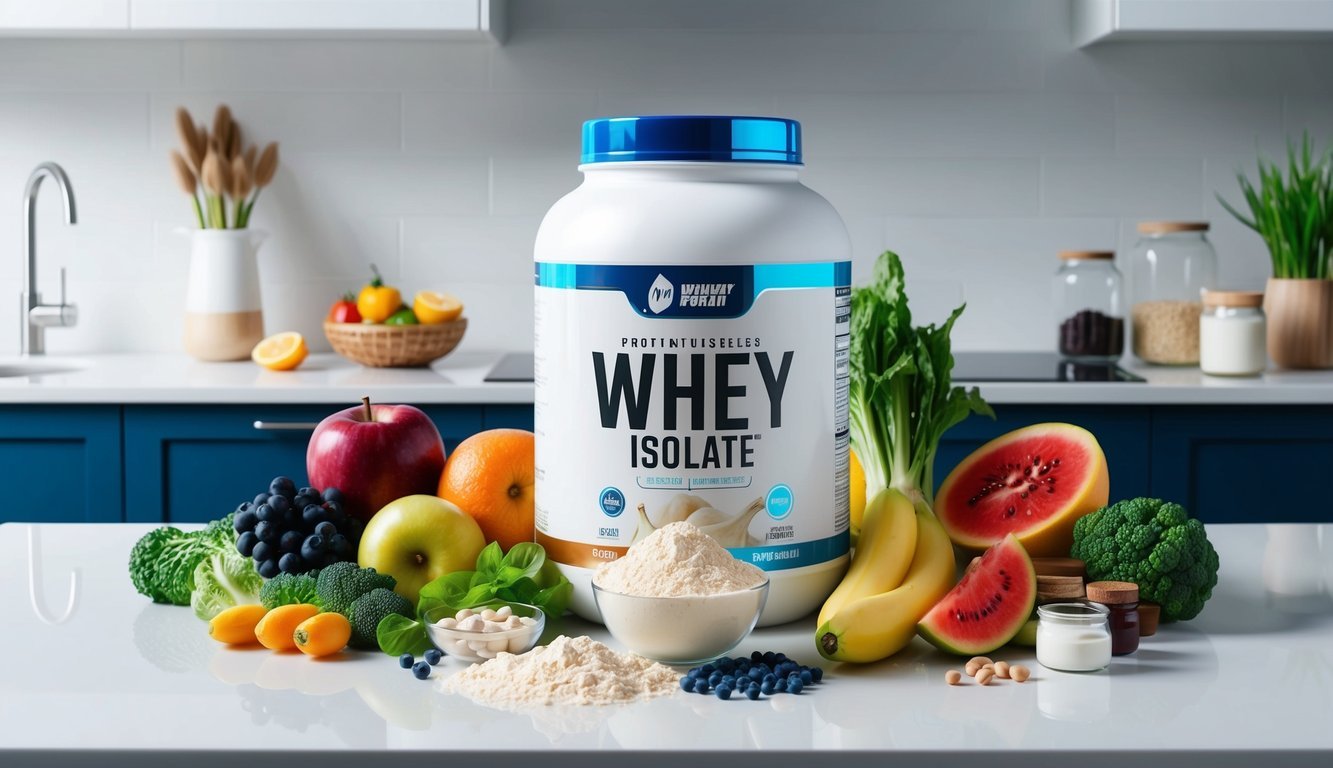
Whey protein isolate is a key player in my muscle growth and recovery routine.
It’s a high-quality protein source that’s quickly absorbed by my body, making it great for post-workout nutrition.
Whey protein isolate typically contains about 90% protein and very little fat or carbohydrates.
This means I get a concentrated dose of protein without added fillers.
It’s perfect for when I’m looking to boost my protein intake without excessive calories.
Research shows that consuming whey protein soon after exercise can enhance muscle protein synthesis.
This is crucial for recovery and growth, especially after intense workouts.
I like to mix it into smoothies or shakes right after my training sessions.
I also appreciate that whey protein isolate can help reduce muscle soreness.
Studies indicate it may mitigate the effects of exercise-induced muscle damage, making my recovery smoother.
For anyone focused on building muscle, incorporating whey protein isolate can be effective.
It fits easily into my diet and supports my fitness goals.
Creatine Monohydrate
I often turn to creatine monohydrate as a go-to supplement for muscle growth.
This compound is naturally found in foods like red meat and seafood, and my body stores it as phosphocreatine in muscles.
When I take creatine, it helps replenish ATP, which is my muscles’ primary energy source during high-intensity workouts.
This boost can improve my performance and may lead to more effective strength training.
What I find fascinating is that creatine doesn’t just enhance energy levels; it also supports protein synthesis.
Studies show it may influence IGF-1, a growth factor important for muscle development.
Incorporating creatine monohydrate into my routine is pretty straightforward.
Most of the time, I mix it with water or my post-workout shake.
Knowing that it can help speed up recovery after intense workouts is an added bonus.
The quicker muscle repair means I can get back into the gym sooner and continue pushing my limits.
Beta-Alanine Powder
I’ve found beta-alanine powder to be a game changer for muscle growth and recovery.
This non-essential amino acid helps boost carnosine levels in muscles.
Carnosine is important for buffering acid during intense workouts.
Taking beta-alanine can enhance my performance.
It allows me to push harder and recover faster from high-intensity exercises.
Research suggests that a daily dose of 4 to 6 grams can significantly improve endurance.
I usually split my intake into smaller doses throughout the day.
This approach helps maximize its benefits.
I’ve noticed reduced muscle fatigue during my workouts, allowing me to train longer and with better intensity.
Beta-alanine is also found in some meats, but supplementation is often more convenient.
Mixing the powder with water or my post-workout shake has become a routine.
It’s not just for bodybuilders; anyone looking to improve exercise capacity can benefit.
4) BCAA Amino Acids
Branched-chain amino acids, or BCAAs, are essential for anyone serious about muscle growth and recovery.
They include leucine, isoleucine, and valine, which play key roles in muscle metabolism.
I often use BCAA supplements to speed up recovery after workouts.
They can help reduce muscle soreness, making it easier to stay on track with training.
Research indicates that taking BCAAs before or after exercise can really help with this.
These amino acids also support protein synthesis, which is crucial for building muscle.
Leucine, in particular, has been shown to stimulate this process.
So, if I’m looking to maximize my gains, I pay attention to my BCAA intake.
Additionally, BCAAs can help reduce fatigue during workouts.
This means I can push myself harder without feeling as worn out.
Incorporating these amino acids into my routine has made a noticeable difference in my performance and recovery.
5) Omega-3 Fish Oil
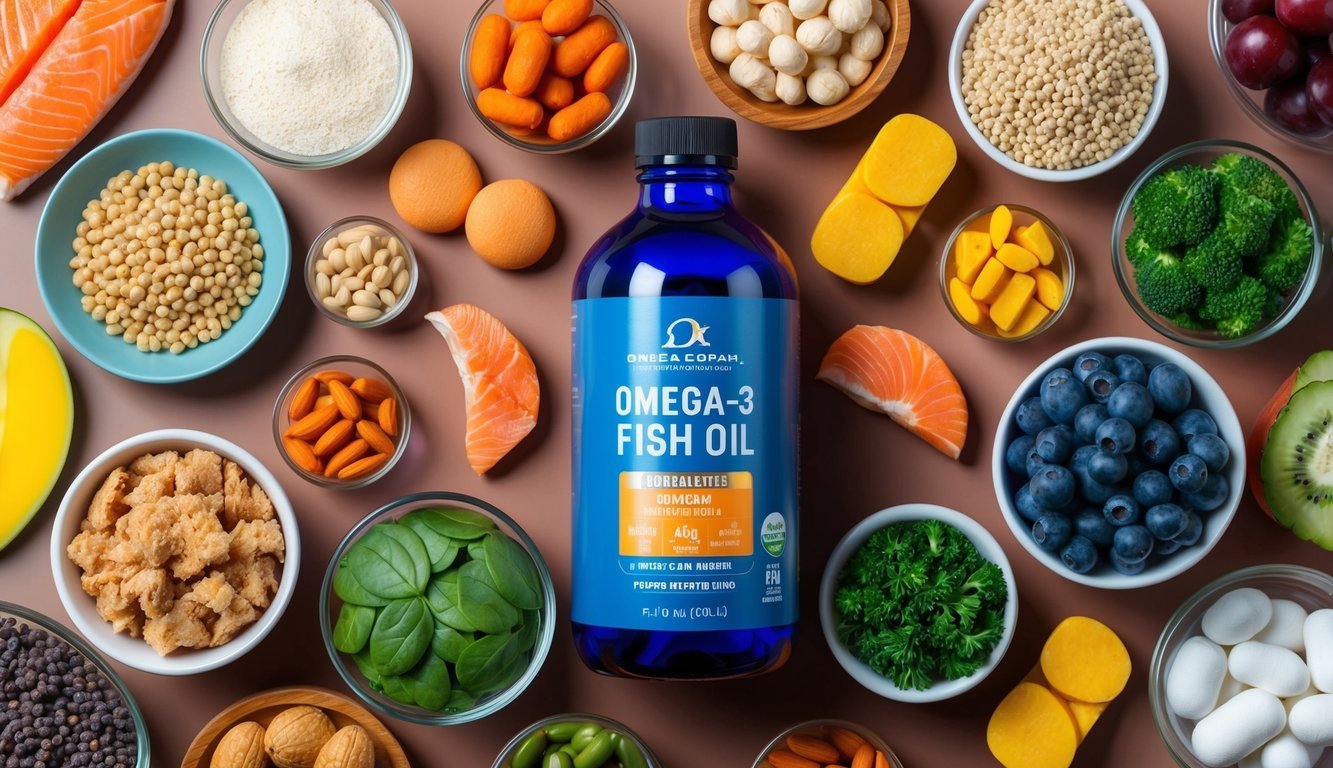
I’ve found that incorporating omega-3 fish oil into my routine has some solid benefits for muscle growth and recovery.
These essential fats help reduce inflammation, which can speed up recovery after intense workouts.
Fish oil supports muscle protein synthesis, meaning it helps my body build and repair muscle tissues effectively.
It also plays a role in limiting muscle breakdown, which is key for keeping my gains intact.
Getting enough omega-3s can improve my overall body composition, helping me build lean muscle while reducing fat.
I prefer to source my omega-3s from fish, but supplements are a great alternative if I’m not eating enough seafood.
Studies suggest that even lower doses of omega-3 can be effective, especially for recovery.
I make sure to stay consistent with my intake to maximize the benefits during training.
6) Calcium Caseinate
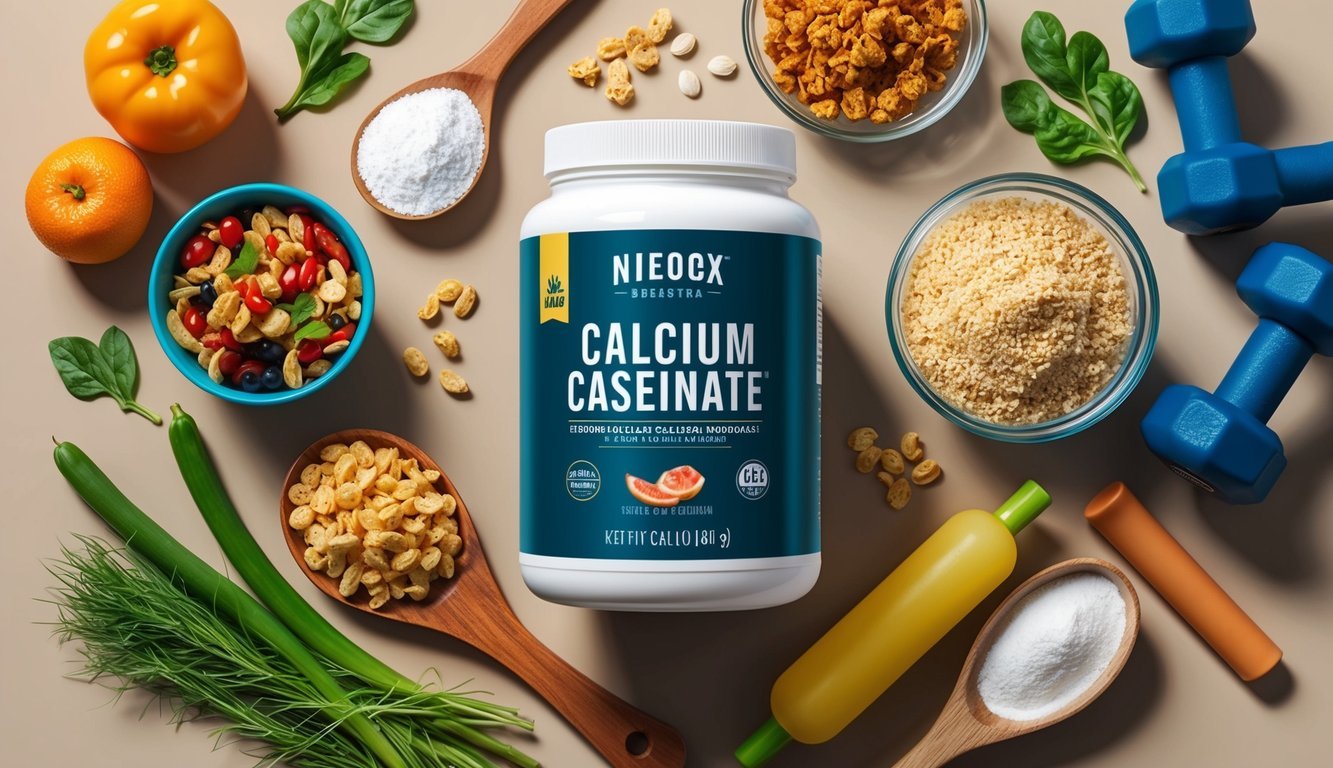
Calcium caseinate is a protein derived from milk.
It’s known for its slow digestion rate, which makes it popular among those looking to support muscle growth.
I often use calcium caseinate as a supplement before bed.
This helps provide a steady release of amino acids during the night, which can contribute to muscle recovery.
Since about 80% of the protein in milk is casein, drinking milk or consuming casein-based products can significantly boost my protein intake.
This is especially beneficial after workouts.
Calcium caseinate also contains essential amino acids, which are crucial for muscle repair and growth.
Plus, it’s a good source of calcium, supporting overall bone health.
Incorporating calcium caseinate into my diet is an easy way to ensure I’m supporting my muscle recovery effectively.
It helps me feel confident that my body is getting the nutrients it needs, especially when I’m aiming for gains.
7) Electrolyte Hydration Mix
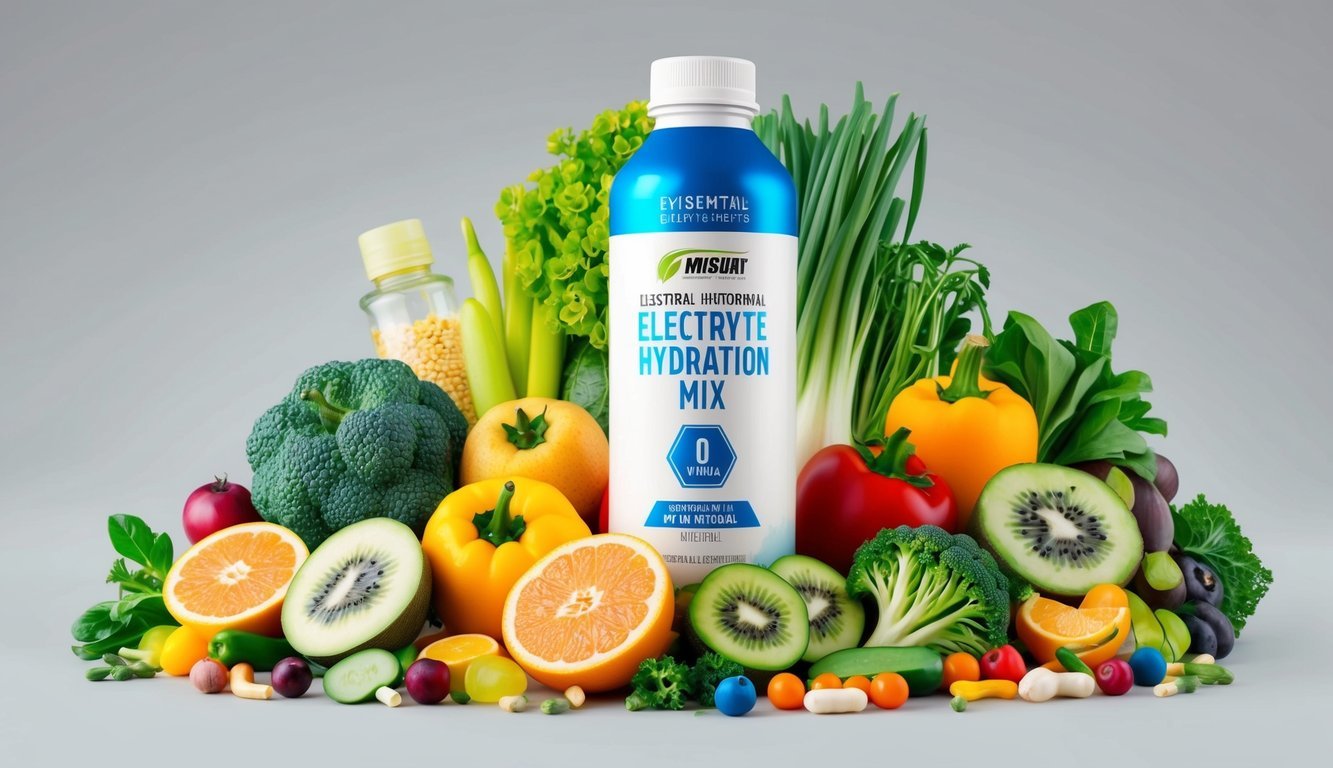
Staying hydrated is crucial for muscle growth and recovery.
I often use an electrolyte hydration mix, especially after intense workouts.
These mixes help replenish lost minerals and maintain fluid balance.
Important electrolytes like sodium, potassium, magnesium, and calcium work together to support muscle function.
Sodium helps regulate blood volume, while potassium is key for muscle contractions.
When I need a quick hydration boost, I reach for a drink that includes these electrolytes.
It not only hydrates me but also aids recovery, helping me feel less fatigued.
Some mixes also contain carbohydrates and vitamins, further enhancing their benefits.
I find that having this mix during my workouts helps keep my energy levels up.
Incorporating an electrolyte hydration mix into my routine has definitely supported my performance and recovery.
It’s a simple way to make sure I’m getting the nutrients I need.
Cottage Cheese
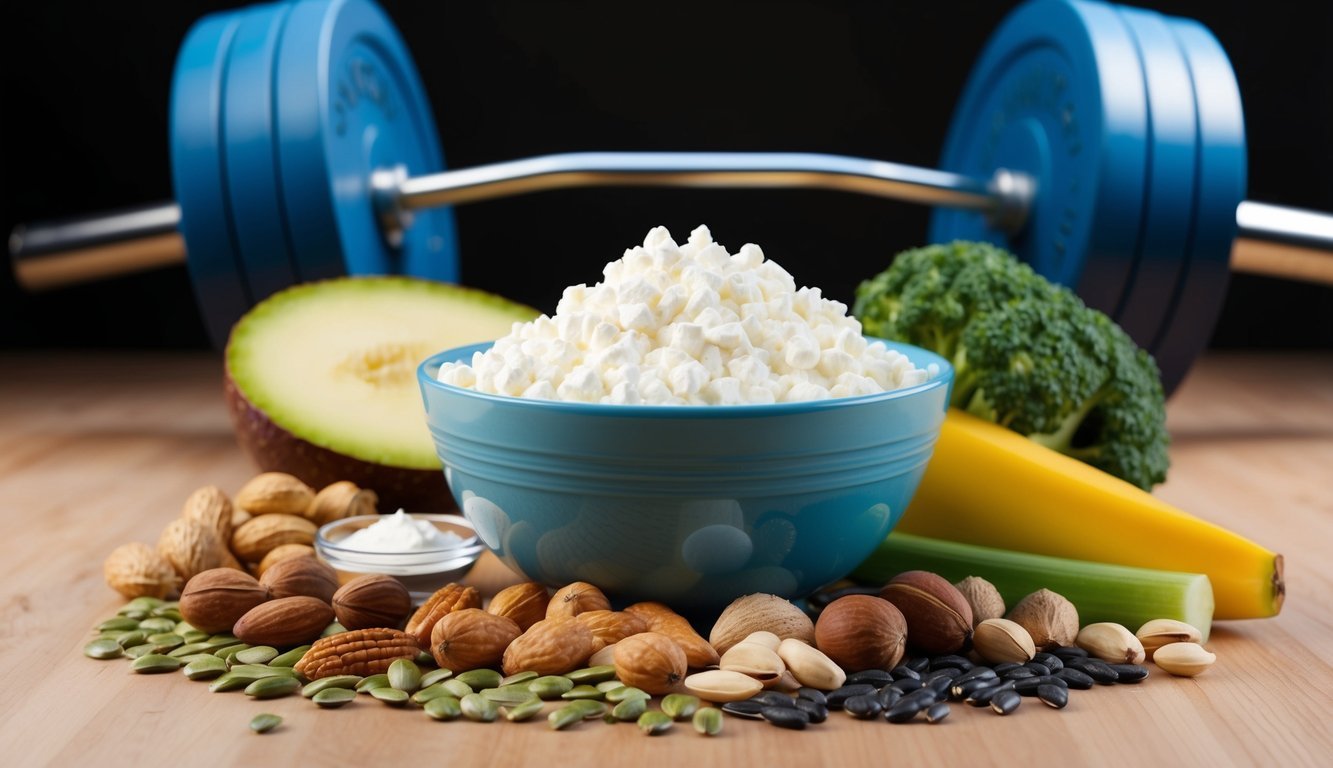
Cottage cheese is one of my favorite snacks for muscle growth and recovery.
It’s packed with protein, which is essential for repairing and building muscle after workouts.
In just one cup, you get about 28 grams of protein.
This makes it a fantastic option for anyone looking to pack on muscle.
The presence of casein protein means it digests slowly, helping to feed your muscles over time.
I often enjoy cottage cheese post-workout.
It not only supports muscle repair but also contributes to bone health due to its calcium content.
Just one cup offers around 138 milligrams of calcium, which is beneficial for strong bones.
If I’m looking for a quick and nutritious snack, cottage cheese is usually my go-to.
I can mix it with fruit or eat it plain.
It’s versatile, tasty, and easy to incorporate into my diet.
Brown Rice

I appreciate brown rice as a versatile food in my muscle growth and recovery plan.
It’s a whole grain, meaning it retains its fiber, vitamins, and minerals, which helps me stay energized.
The fiber content in brown rice aids digestion and keeps me full longer.
This is especially useful when I’m managing my overall calorie intake while trying to build muscle.
Brown rice also provides complex carbohydrates, which are essential for replenishing glycogen stores after workouts.
This is key to effective recovery, allowing me to hit the gym hard again soon.
I often mix brown rice with lean proteins and vegetables.
Doing this not only adds variety to my meals but also boosts the nutritional value.
While some might prefer white rice for its quick energy release, I find that brown rice offers more sustained energy, which is vital during intense training sessions.
10) Spirulina Tablets

I’ve recently added spirulina tablets to my routine, and they’ve made a noticeable difference.
These little green tablets pack a serious punch in terms of nutrients.
Spirulina is rich in protein, containing all essential amino acids.
This makes it a great supplement for muscle repair and growth after workouts.
I appreciate that it supports recovery by reducing oxidative stress in the body.
What’s great is that spirulina is also a source of vitamins like B12, which can be hard to get on a vegan diet.
Plus, it provides important minerals like iron that help in oxygen transport during exercise.
I find that taking spirulina tablets is convenient.
They’re easy to swallow and fit seamlessly into my daily routine.
Just a few tablets can boost my nutritional intake without much hassle.
Incorporating spirulina into my diet has been a simple yet effective strategy to enhance my muscle-building efforts.
It feels good knowing I’m fueling my body with something so nutrient-dense.
Balanced Diet for Muscle Growth
A balanced diet is crucial in supporting muscle growth and recovery.
It involves a strategic mix of macronutrients and micronutrients, ensuring that I fuel my body effectively.
Proteins provide the essential building blocks for muscle repair, while carbohydrates supply the energy needed for intense workouts.
Healthy fats also play a role in hormone regulation and overall well-being, contributing to sustained performance.
Incorporating healthy metabolism tips into my routine, such as staying hydrated and consuming nutrient-dense foods, helps optimize energy levels and recovery.
Understanding Macronutrients
Macronutrients are my body’s primary source of energy, and they consist of proteins, carbohydrates, and fats.
Each plays a unique role in muscle development.
- Protein: I focus heavily on protein, ideally consuming around 1.2 to 2.2 grams per kilogram of body weight daily. This helps with muscle repair and growth.
- Carbohydrates: Carbs are equally important. I aim for about 2-3 grams of carbs per pound of body weight each day to fuel my workouts and maintain energy levels.
- Fats: Healthy fats, like those from avocados and nuts, are vital too. They support hormone production and overall health.
Aiming for an appropriate ratio of these macronutrients maximizes my muscle-building potential.
Role of Micronutrients
While macronutrients take center stage, I can’t overlook micronutrients.
Vitamins and minerals play supportive roles that enhance muscle growth and recovery.
- Vitamins: B vitamins are essential for energy production, while Vitamin D aids in muscle function and strength. I make sure to include leafy greens and fruits rich in these vitamins in my diet.
- Minerals: Zinc and magnesium are critical for muscle repair and hormone regulation. Foods like nuts, seeds, and whole grains help meet my needs.
Incorporating a variety of colorful fruits and vegetables ensures I get sufficient micronutrients to support my training regimen effectively.
This holistic approach allows me to optimize my performance and recovery.
Importance of Proper Hydration
Staying properly hydrated is crucial for muscle growth and recovery.
It affects everything from energy levels to muscle function.
Here’s a look at how hydration can impact my training.
Hydration and Muscle Recovery
Water plays a vital role in muscle recovery.
When I’m dehydrated, it can slow down protein synthesis, which is essential for repairing and building muscles.
To keep my muscles functioning optimally, I make sure to hydrate adequately.
Here are some key points I focus on:
-
Pre-Workout Hydration: I aim to drink 16-20 ounces of water 2-3 hours before a workout. This helps improve blood flow and endurance.
-
During Training: Sipping water throughout my session keeps me energized and reduces the risk of cramps.
-
Post-Workout Replenishment: After exercising, I rehydrate to replace fluids and support recovery. This helps clear toxins and transport nutrients to tired muscles.
Keeping my hydration levels in check is just as important as the food I eat for achieving my muscle goals.

